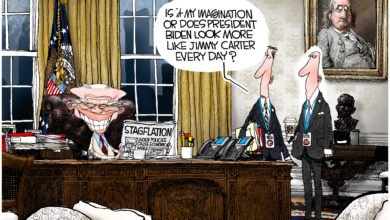Interview with Mark McNeilly, author of “Sun Tzu and the Art of Modern Warfare”
In January, we published our review of Mark McNeilly’s book, Sun Tzu and the Art of Modern Warfare, an excellent book explaining Sun Tzu’s ancient military treatise, the Art of War, in simple terms that everyone can understand and using many historical examples to illustrate the point. Desiring to learn more, I have conducted an interview with McNeilly. My questions and his answers follow.
Mark McNeilly is the author of three books, including Sun Tzu and the Art of Business: Six Principles for Managers and Sun Tzu and the Art of Modern Warfare. He is a Lecturer at the University of North Carolina’s Kenan-Flagler Business School, an Expert Blogger for Fast Company magazine, a former marketing executive with experience at IBM and Lenovo and (very long ago) was a Captain in the US Army – National Guard. You can follow him at @markmcneilly or learn more at www.suntzustrategies.com.
Zbigniew Mazurak: Thanks for having this interview with us. Where did your interest in strategy originate from?
Mark McNeilly: I got interested in strategy thru reading military history when very young. I was fascinated by the importance of strategy in determining the fate of battles, wars and nations. So I read as much about warfare as I could, mostly World Wars I and II but also other periods. It was during this time that I first learned of and read Sun Tzu’s Art of War. After reading it and comparing the approaches to strategy in World War I (which was primarily direct headlong attacks into strong and deep defensive systems) versus WW II (which relied on the shock, speed and maneuver of the Blitzkrieg) it became clear to me how insightful this ancient book on warfare was. The concepts Sun Tzu spoke about centuries ago still applied to modern strategy and warfare. And as I was to later discover, his principles could be applied to any competitive situation, whether it was warfare, business, politics or sports.
ZM: What prompted you to write the books Sun Tzu and the Art of Business and Sun Tzu and the Art of Modern Warfare?
McNeilly: I graduated college with a degree in business, a job at IBM and, through ROTC, a commitment to serve in the reserves for six years. I continued my interest in military strategy but now also started learning about business strategy as well. When I became involved in competitive intelligence and corporate strategy with IBM I saw the opportunity to apply Sun Tzu’s ideas in business. I knew a lot of business people read (or at least bought) The Art of War but hadn’t seen any books that did a good job of relating Sun Tzu’s military strategies to business. Frankly, The Art of War can be hard for businesspeople to read and connect with, given it’s a series of quotations about ancient Chinese warfare. So my goal in writing Sun Tzu and the Art of Business was to make Sun Tzu’s concepts easy to understand, clearly applicable to business and interesting to learn about. I did this by organizing his various ideas into six overarching principles, the extensive use of military and business examples and (hopefully) a straightforward writing style.
Later I wrote Sun Tzu and the Art of Modern Warfare to achieve essentially the same goal but in a different arena; make Sun Tzu’s ideas easy to understand, clearly applicable to warfare throughout the ages and interesting to learn about. It was just for a different audience so the principles were adapted to that realm. They are:
1. Win All Without Fighting: Achieving the Objective Without Destroying
2. Avoid Strength, Attack Weakness: Striking Where the Enemy Is Most Vulnerable
3. Deception and Foreknowledge: Winning the Information War
4. Speed and Preparation: Moving Swiftly to Overcome Resistance
5. Shaping the Enemy: Preparing the Battlefield
6. Character-based Leadership: Leading by Example
ZM: If you had to underline the most important lesson you believe we should learn from Sun Tzu’s treatise, what would it be?
McNeilly: Wow, that’s a tough one but if I had to pick one it would “Avoid Strength, Attack Weakness.” Sun Tzu explains the concept well via this quote, “Now an army may be likened to water, for just as flowing water avoids heights and hastens to the lowlands, so an army avoids strengths and attacks weakness.” What Sun Tzu is saying is that, just as water takes the path of least resistance to get to where it’s going, one should follow the path of least resistance to be successful as well.
Now, when I say this people often respond, “Well, that’s obvious.” To which I say, “Yes, it is but there are many instances in which people still attack their competition head-on. Why do we do it? It’s the glamor of two knights jousting, the shootout at high noon in the Western. And it doesn’t take a lot of creativity and is emotionally appealing to go right after the opponent. But while the high testosterone approach is alluring it doesn’t have a good history of paying off in terms of achieving one’s objectives profitably. Look at the results of the uncreative attrition strategies of World War I. Millions dead, lands in waste, people starving and countries in revolution. Even the victors were bled dry.
On the flip side avoiding strength and attacking weakness works. In the business world Netflix and Redbox didn’t attack Blockbuster by building a bunch of stores. They employed creative new strategies that avoided Blockbuster’s strength and served customers in new ways. As a result both were very successful and Blockbuster went bankrupt. Avoiding strength and attacking weakness is the most efficient and effective means of winning; minimizing the resources you use to win while maximizing your return. This is the very definition of success.
ZM: In your opinion, which general in history took a Sun Tzu-like approach most consistently?
McNeilly: Well, there are many examples but one person I’d have to highlight would be Bismarck. He wasn’t a general but a statesman, and as such he knew how to use both military and diplomatic power to achieve his ends. And I think this is an important point – Sun Tzu’s ideas apply not just to warfare but to statesmanship and grand strategy. His strategic principles encompass warfare but go beyond far beyond it. This is important because a country can employ many means, not just warfare, to achieve its goals. So the scope needs to be broader.
Back to Bismarck – it was through his diplomatic abilities to isolate his opponents and his willingness to use the Prussian military to then defeat them that he was able to create a modern and powerful state. Now, did he know of and use Sun Tzu’s Art of War? Doubtful but that’s not the point. I think of Sun Tzu’s principles as basic truths or laws about how strategy works; essentially like the equivalent of the laws of physics, but for strategy.
ZM: Do you know of any instance where the victor did not adhere to Sun Tzu’s teachings but still won?
McNeilly: Well, it depends on how you define “winning”. Many people look at Napoleon and admire his military feats. And it is true he won many battles, many of them brilliantly. But he didn’t know when to stop and consolidate his winnings. Knowing when to fight and not to fight is a key pointSun Tzu makes. So as a result Napoleon ended up losing everything he had built up, going from being the Emperor of much of Europe and calling the tune to being relegated to a little island cut off from the rest of the world. As Sun Tzu said, “To win one hundred victories in one hundred battles is not the acme of skill. To subdue an enemy without fighting is the acme of skill.”
ZM: The U.S. continues to face anunsafe world – there is China’s military build-up, Iran’s nuclear program and a continuing terrorist threat from Al-Qaeda. What would be Sun Tzu’s advice on how to navigate these hazardous waters?
McNeilly: I would go back to principles starting with the first one, Win All Without Fighting: Achieving the Objective Without Destroying It. We need to define what our objectives are – what do we want the world to look like in 2020 or 2030? Then what is our strategy to make that happen? Right now it’s not clear to me that we have a grand strategy and are putting in place the means to achieve it. We appear more to be reacting to events than shaping them, e.g. the Arab Spring.
Then looking at relative strengths and weaknesses we need to follow Sun Tzu’s advice, “Know the enemy and know yourself; in a hundred battles you will never be in peril.” Right now I’m concerned about a number of our weaknesses; number one is the debt situation and the continuing weakness of the economy. The management of the economy over the last four years has not produced a robust recovery and I don’t see much change in that direction unfortunately. Without economic power we will lack the resources we need to implement our strategy militarily and diplomatically, as the current sequestration points out. While we are technologically advanced and we need to continue our lead in this area we are also dependent on that same technology. And that technology is very vulnerable to cyber-warfare and attacks on our communications systems. I’m not convinced we’ve figured out how to deal with these types of threats or have taken them seriously enough. And I think we’ve dragging our feet on missile defense, which is important as a deterrent to nations like North Korea and Iran. Lastly, I think we need to utilize our allies (and potential allies) more and put more responsibility on them rather than always taking the lead. Great Britain did this very effectively for hundreds of years and it enabled that country to exert influence far out of proportion to its own assets. For example, utilizing Japan, South Korea and potentially India to balance China should be a top priority.
All that said we continue to have many strengths; for example our current military forces, our technology, and our entrepreneurialism. And we have an ace in the hole if we decide to use it – the new energy deposits we are sitting on. If we choose to use them we simultaneously dramatically improve our financial situation, reduce our dependence on foreign energy and reduce the flow of money to danger spots. These new resources could help us further leverage our strengths and fix our weaknesses – IF we choose to use them and then apply the resulting wealth appropriately.
ZM: Thanks for the interview.




